2023年中考英语复习 第二模块 动 词第一节 动词和动词短语课件(共115张PPT)
文档属性
| 名称 | 2023年中考英语复习 第二模块 动 词第一节 动词和动词短语课件(共115张PPT) |
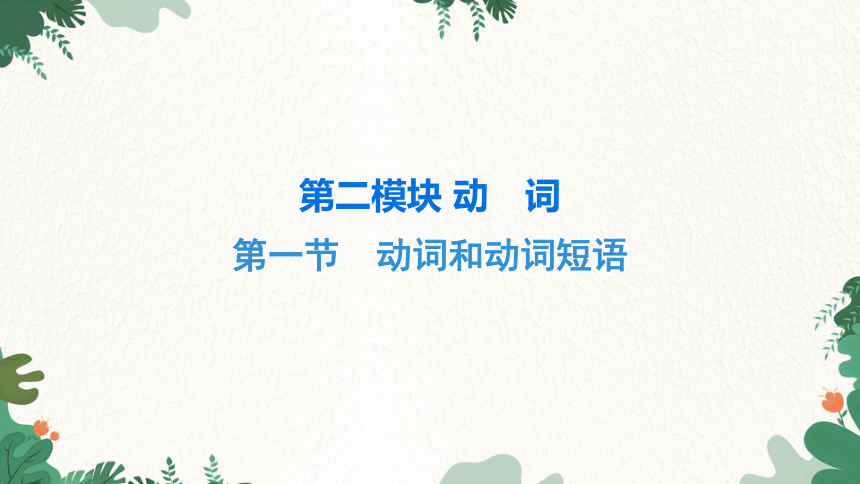
|
|
| 格式 | pptx | ||
| 文件大小 | 3.6MB | ||
| 资源类型 | 教案 | ||
| 版本资源 | 人教新目标(Go for it)版 | ||
| 科目 | 英语 | ||
| 更新时间 | 2023-06-11 19:56:31 | ||
图片预览

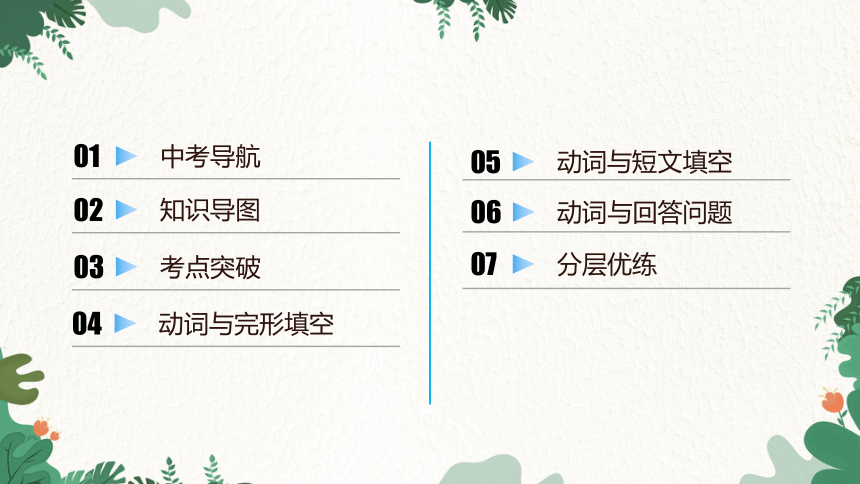
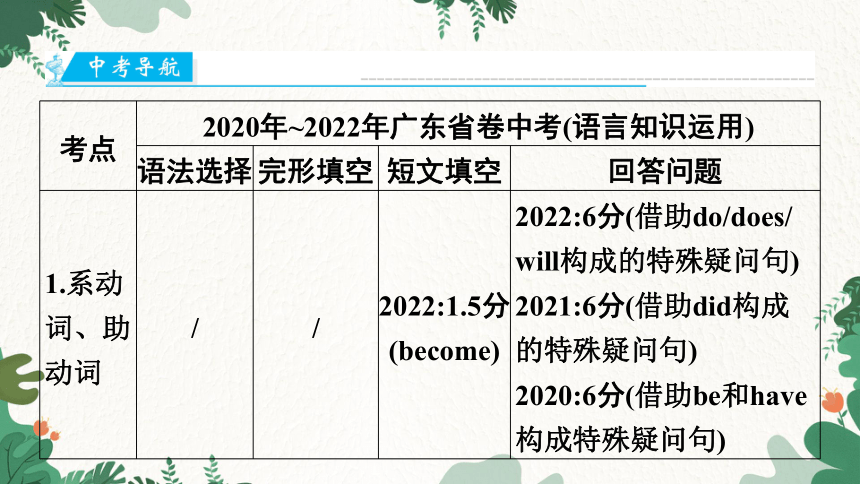
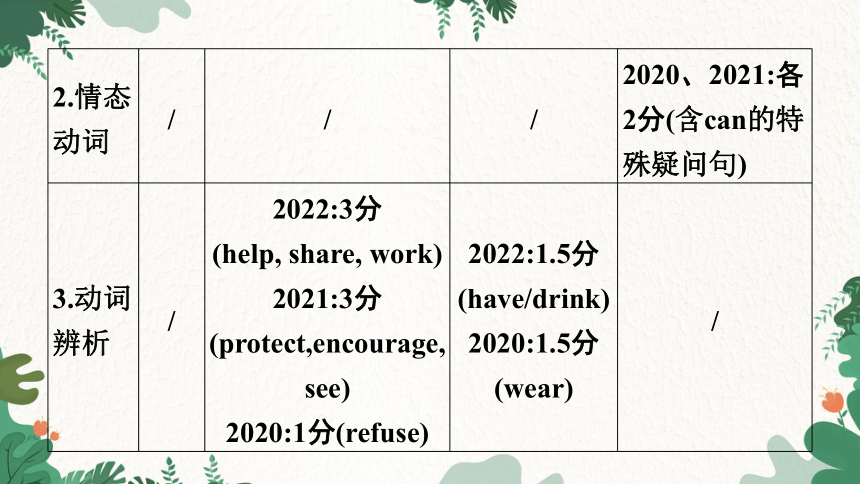
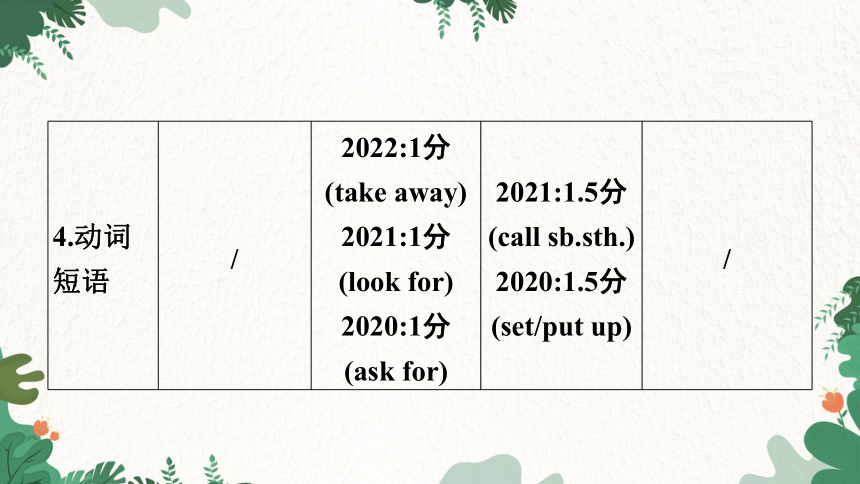
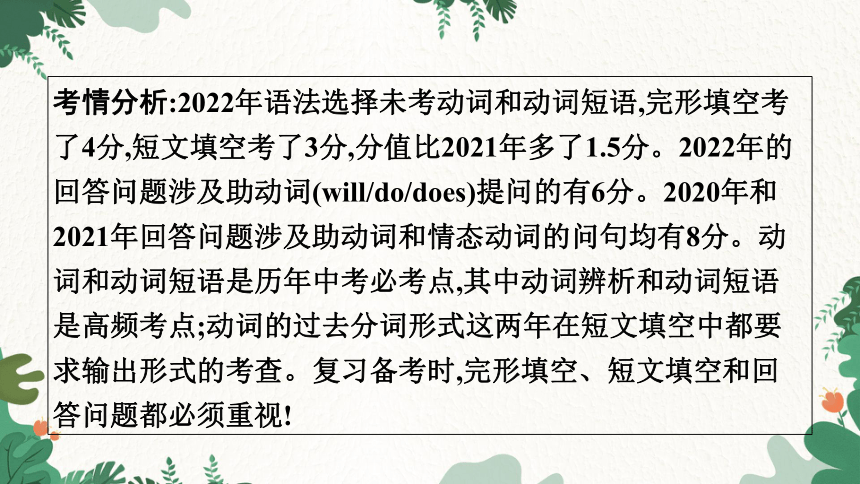
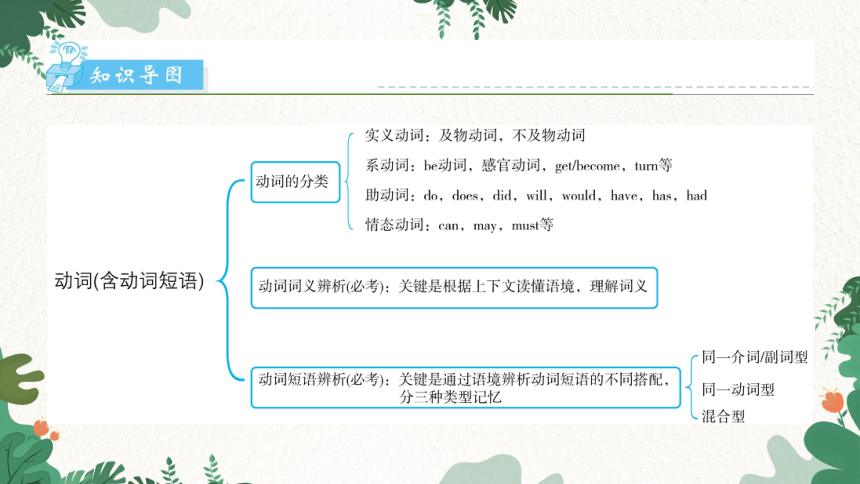
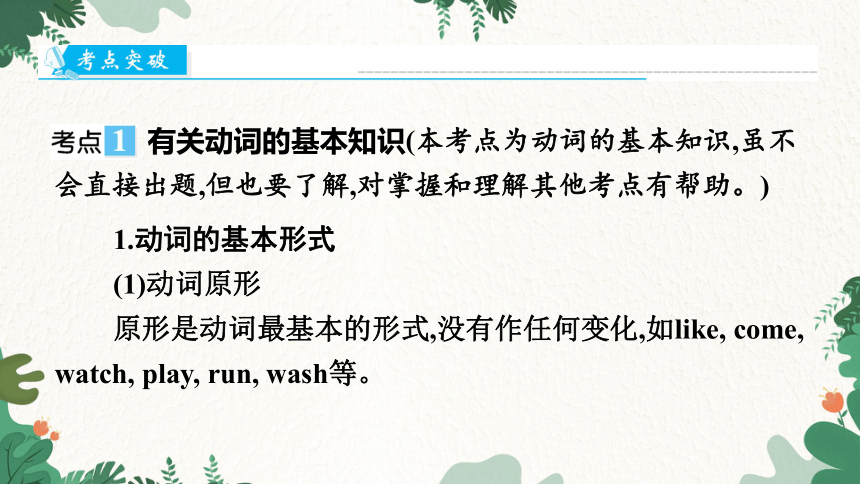
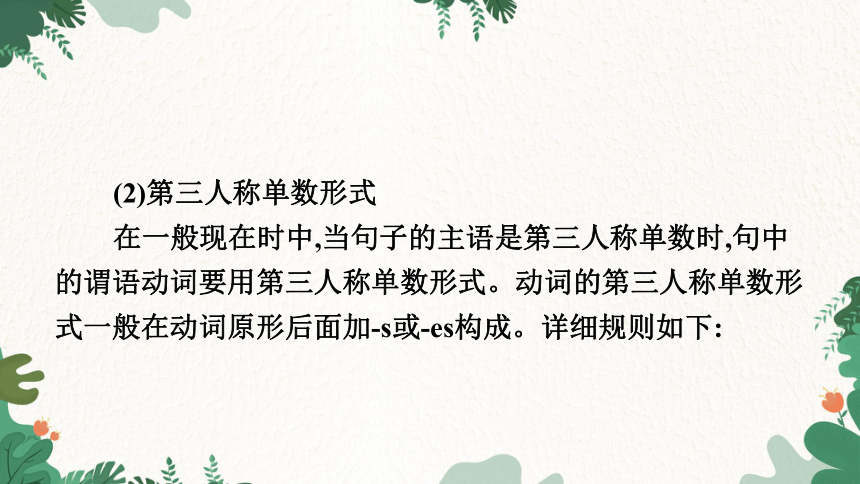
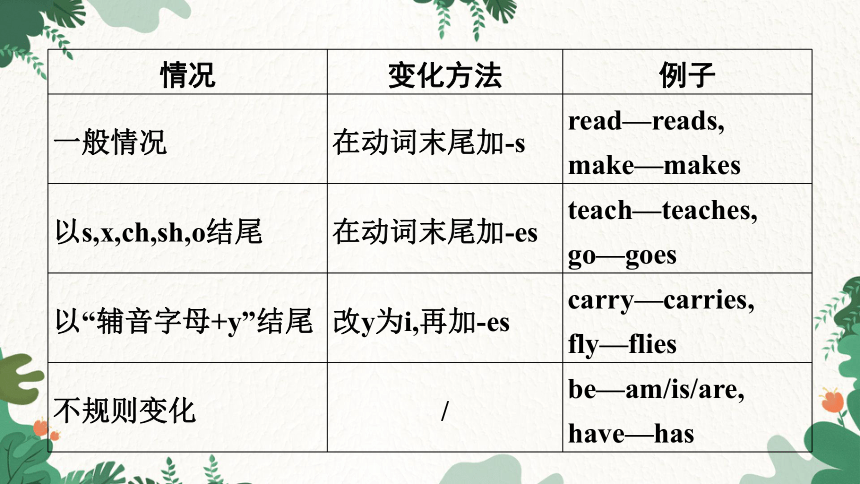
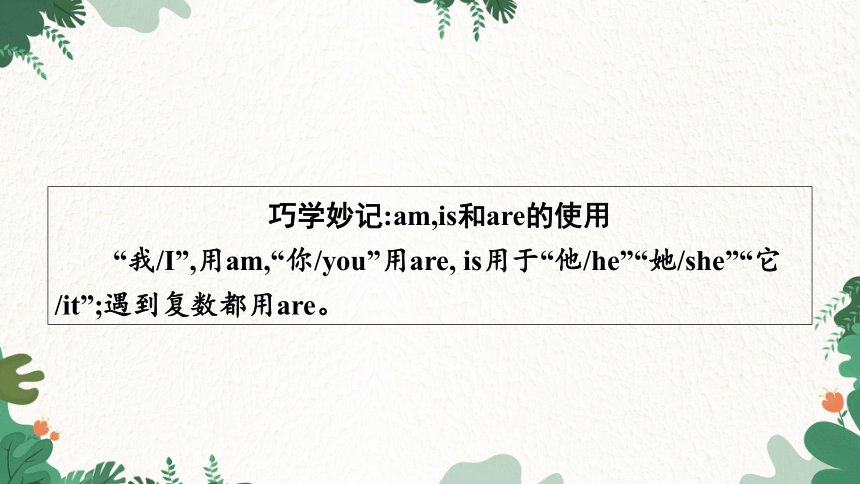
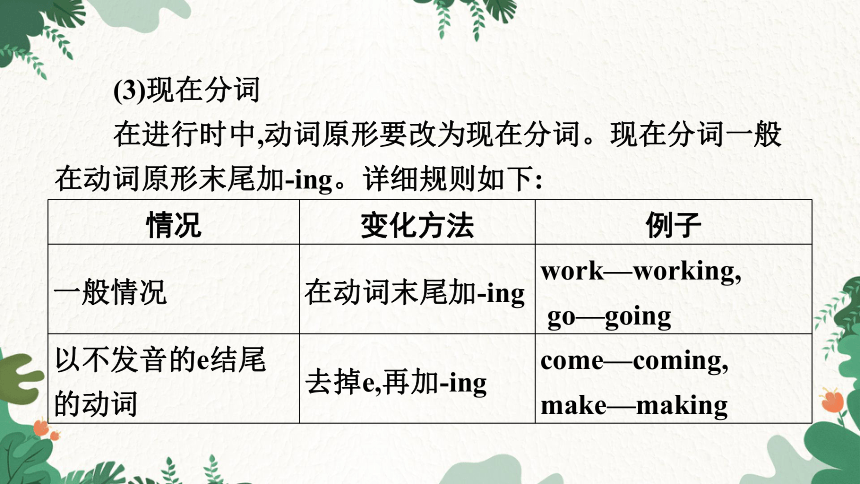
文档简介
(共115张PPT)
第二模块 动 词
第一节 动词和动词短语
01
中考导航
02
知识导图
03
考点突破
04
动词与完形填空
06
动词与回答问题
07
分层优练
05
动词与短文填空
考点 2020年~2022年广东省卷中考(语言知识运用)
语法选择 完形填空 短文填空 回答问题
1.系动词、助动词 / / 2022:1.5分 (become) 2022:6分(借助do/does/ will构成的特殊疑问句)
2021:6分(借助did构成的特殊疑问句)
2020:6分(借助be和have构成特殊疑问句)
2.情态动词 / / / 2020、2021:各2分(含can的特殊疑问句)
3.动词辨析 / 2022:3分 (help, share, work) 2021:3分 (protect,encourage, see) 2020:1分(refuse) 2022:1.5分 (have/drink) 2020:1.5分 (wear) /
4.动词短语 / 2022:1分(take away) 2021:1分(look for) 2020:1分 (ask for) 2021:1.5分 (call sb.sth.) 2020:1.5分 (set/put up) /
考情分析:2022年语法选择未考动词和动词短语,完形填空考了4分,短文填空考了3分,分值比2021年多了1.5分。2022年的回答问题涉及助动词(will/do/does)提问的有6分。2020年和2021年回答问题涉及助动词和情态动词的问句均有8分。动词和动词短语是历年中考必考点,其中动词辨析和动词短语是高频考点;动词的过去分词形式这两年在短文填空中都要求输出形式的考查。复习备考时,完形填空、短文填空和回答问题都必须重视!
有关动词的基本知识(本考点为动词的基本知识,虽不会直接出题,但也要了解,对掌握和理解其他考点有帮助。)
1.动词的基本形式
(1)动词原形
原形是动词最基本的形式,没有作任何变化,如like, come, watch, play, run, wash等。
(2)第三人称单数形式
在一般现在时中,当句子的主语是第三人称单数时,句中的谓语动词要用第三人称单数形式。动词的第三人称单数形式一般在动词原形后面加-s或-es构成。详细规则如下:
情况 变化方法 例子
一般情况 在动词末尾加-s read—reads, make—makes
以s,x,ch,sh,o结尾 在动词末尾加-es teach—teaches, go—goes
以“辅音字母+y”结尾 改y为i,再加-es carry—carries, fly—flies
不规则变化 / be—am/is/are, have—has
巧学妙记:am,is和are的使用
“我/I”,用am,“你/you”用are, is用于“他/he”“她/she”“它/it”;遇到复数都用are。
(3)现在分词
在进行时中,动词原形要改为现在分词。现在分词一般在动词原形末尾加-ing。详细规则如下:
情况 变化方法 例子
一般情况 在动词末尾加-ing work—working,
go—going
以不发音的e结尾的动词 去掉e,再加-ing come—coming, make—making
(续表)
情况 变化方法 例子
以ie结尾的动词(初中共3个) 改ie为y,再加-ing die—dying,
lie—lying,
tie—tying
以重读闭音节结尾,末尾只有一个辅音字母的动词 先双写这一辅音字母,再加-ing get—getting,
run—running
plan—planning, chat—chatting
(4)过去式
在一般过去时中,动词原形要改为过去式。过去式一般在动词原形末尾加-ed。详细规则如下:
情况 变化方法 例子
一般情况 在动词末尾加-ed work—worked, want—wanted
以e结尾的动词 直接加-d dance—danced, hope—hoped
以辅音字母加y结尾的动词 改y为i,再加-ed carry—carried,
try—tried
以重读闭音节结尾,末尾只有一个辅音字母的动词 先双写这一辅音字母,再加-ed stop—stopped, chat—chatted
(不规则变化形式详见《早读材料》中的“不规则动词一览表”)
(5)过去分词
在完成时态和被动语态中,动词原形要改为过去分词。规则动词的过去分词同过去式。
2.及物动词和不及物动词
动词根据能否接宾语可分为及物动词和不及物动词。如下表:
及物动词 及物动词本身意义不完整,需要接宾语才能使其意思完整。 如: love, need, ask, want, have等 主要用于下列三种句型中:①动词+宾语;②动词+宾语+宾补;③动词+间接宾语+直接宾语 ①Would you please open the window 请你打开窗户好吗
②We call him Bill.我们叫他比尔。
③May I ask you a question 我可以问你一个问题吗
不及物动词 不及物动词自身意思完整,无须接宾语。 如:happen, come, go, run, work等 / ①Horses run fast.马跑得快。
②They work in a factory.他们在一家工厂工作。
系动词、助动词(本考点为动词的基本知识,考查频率较低,但也要了解、掌握,对完成回答问题和理解其他考点有帮助。)
分类 定义 常见词 例子
系 动 词 本身有意义,但不能单独作谓语,须和表语构成谓语部分。这些词没有被动语态形式,通常不用于进行时态。 ①be动词 My father is a doctor.我父亲是一名医生。
②五变:be/become(变成), turn(变色等), get(变温等), go(变质等) be/become happy, turn blue, get warm/dark, go bad(变质)
③五感官:look(看起来), sound(听起来), taste(尝起来),smell(闻起来), feel(摸起来) The mountain looks so beautiful.这座山看起来真漂亮。
It sounds great!这听起来很棒!
分类 定义 常见词 例子
助 动 词 助动词本身无词义或意义不完整,不能单独用作谓语。它必须和别的动词连用,帮助构成各种时态、语态、否定句和疑问句等结构,有人称、数和时态的变化。 ①is, am, are, was,were, isn’t, aren’t, wasn’t, weren’t, am not Tom is reading a book under the tree.汤姆正在树下看一本书。(is帮助构成进行时)
②do, does, did, doesn’t, don’t, didn’t What did you do last Saturday 上星期六你做了什么 (did用于构成疑问句)
③will,won’t,have,haven’t,has, hasn’t Will you go to Beijing tomorrow 你们明天去北京吗 (will帮助构成一般将来时)
(续表)
(2022广东,短文填空)And now it has 72. popular in Europe and America.
become
情态动词
1.情态动词的类型
①只作情态动词的有: must, can(could), may(might);
②可作情态动词也可作实义动词的有: need, dare;
③可作情态动词也可作助动词的有: will(would), shall (should);
④具有情态动词的某些特征的有: have to, ought to。
2.情态动词的特征
①有一定的词义,但不能单独作谓语,必须和行为动词或系动词连用,构成谓语。
②无人称和数的变化(have to例外:用于第三人称单数时用has to)。如:
We must stay here.我们必须待在这儿。
We have to walk home.我们不得不步行回家。
He has to walk home.他不得不步行回家。
③后接动词原形,即不带to的不定式。如:
She may lose her way.她可能迷路了。
④具有助动词的作用,可用来构成否定句、疑问句及用于简明答语。如:
—Can you sing an English song 你会唱英语歌吗
—Yes, I can.是的,我会。
3.几个重要情态动词的用法
情态动词 用法 例子
can/ could 表示能力,意思是“能,会”。can的否定形式是can’t (cannot),意思是“不能,不会”。在过去时态中则对应用could和couldn’t。 My brother can’t fly a kite.
我弟弟不会放风筝。
Could you swim at the age of six
你6岁时会游泳吗
情态动词 用法 例子
can,may 表示请求和允许,意思是“可以”。在疑问句中表示有礼貌地提出请求。 —May I close the window 我可以关窗吗
—Yes, you can.是的,你可以。
—Can I come in 我可以进来吗
—No, you can’t.不,你不能。
(续表)
can’t 表示不允许,can’t “不能”。mustn’t “禁止”,态度比can’t强硬。 We can’t speak loudly on the phone in public.
我们不能在公共场合大声打电话。
mustn’t You mustn’t drive the car after drinking wine.
喝酒后禁止开车。
can’t “不可能”。 The book can’t be Tom’s. Look! Lucy’s name is on the cover of the book.这本书不可能是汤姆的。看!露西的名字在书的封面上。
might “可能”,可能性比may更小;或表示对过去事情的猜测。 He might go abroad yesterday.
他可能昨天就出国了。
He may/might come tomorrow.
他可能明天会来。
may “可能”,可能性较小。 He may know the way to the post office. But I am not sure.他可能知道去邮局的路,但我不确定。
can 表示潜在的可能性。 The man is our new teacher. Can it be true 这个男人是我们的新老师,这是真的吗
must “肯定;一定是”,常用于肯定句中,表示肯定性的猜测,可能性较大。 The book must be Li Rui’s. His name is on it.
这本书肯定是李睿的。他的名字在书上。
注意:表推测可能性的大小依次是: can’t(不可能) 4.情态动词的注意点
情态动词 用法 例子
can/ could 表示请求许可时,can 一般用于平辈、熟人之间; could语气较为委婉客气,一般用于向老师、父母和长辈请求许可。 —Could I watch TV now, Dad
爸爸,我现在可以看电视吗
—Yes, you can.可以。
be able to 表示“能够;可能”。可以用于各种时态。 They will be able to tell you the news soon.
他们很快就能告诉你消息了。
情态 动词 用法 例子
have to/ must ①二者都是 “必须”的意思, have to表示客观需要,must表示说话人的主观看法,即主观上的必要。 My brother was very ill, so I had to call the doctor in the middle of the night.
我弟弟病得很厉害,我只得半夜里把医生请来。(客观上需要做这件事)
He said that they must work hard.他说他们必须努力工作。(主观上要做这件事)
(续表)
have to/ must ②在否定结构中:not have to表示“不必”, mustn’t表示 “禁止”。 You don’t have to tell him about it.你不一定要把此事告诉他。
You mustn’t tell him about it.你一定不要把这件事告诉他。
need(既是情态动词又是实义动词) ①作为情态动词,主要用于否定句和疑问句中,表示“必须,必要”。 —She needn’t go there right now.她不需要现在去那儿。
—Need I come 那需要我过去吗
—Yes, you must.是的,你必须来。
②作实义动词,表示“需要,要求”,常用结构:need+n./to do sth.。 She needs some food and drink.她需要一些食物和饮料。
We need to repair the road in two weeks.我们要在两周内修好这条路。
had better 后接动词原形,表劝告、建议,意思是“最好做某事”。其否定形式是had better not do。 You had better stay at home.你最好待在家里。
shall/should ①shall用于第一人称的疑问句,征询听话人的意见、看法或请求指示。 Shall I take you to the hospital
要不要我带你去医院
②shall用于第二、三人称时,表允诺、警告、命令等。 You shall do as I say. 你应该照我说的做。
③should用于表“义务,应该”。 We should help the poor. 我们应该帮助穷人。
情态动词记忆口诀
情态动词一要点,动词原形跟后面。can“能够”,may“许可”。must“责任”或“义务”,否定回答needn’t换。need“需要”,should“应该”,would“愿”,have to“被迫”表客观。
( )1.(2019广东,单项填空)Dirty air and water are harmful. They _______kill plants, and even people.
A.can B.can’t C.should D.shouldn’t
( )2.(2021广州,语法选择) “Well,” said the first,“I know
I 8 do much, but perhaps I can cheer him a little. I’ll go down to show my support, if I can’t do anything more. Here I go!”
A. needn’t B. shouldn’t C. mustn’t D. can’t
D
A
( )3.(2020广州,语法选择)Soon the house is filled with books.His wife, Alice, is angry.“You 3 do something!”
A.must B.could C.would D.may
( )4.(2019广州,语法选择)For their great service, we 9 forget these animals.
A.shouldn’t B.may not
C.don’t have to D.needn’t
A
A
动词短语(本考点为完形填空和短文填空的高频考点)
常考动词短语归纳:
1.同一动词型
look look for寻找 look after照顾;看管 look around环顾四周
look up查找(在字典或参考书中);抬头看
look at看…… look like看起来像……
look through 浏览 look down upon看轻
look over仔细检查 look out 向外看
turn turn on打开(电器,水龙头等)
turn off关上(电器,水龙头等)
turn up开大(音量,煤气)
turn down关小(音量,煤气);拒绝
fall fall off从……掉下来 fall behind落后
fall over摔跤,跌倒在地 fall down跌倒;倒塌
put put away收拾好,放好 put on穿上
put…down把……放下 put up举起;张贴;建造
send send for派人去请 send away开除,除名
send up发射 send out发出
hear hear of听说 hear from收到某人来信
hurry hurry off匆忙离去 hurry up赶快
take take a rest休息一会 take a walk散步
take away拿走 take off脱掉,(飞机)起飞
take…to… 把……拿到(带到)……
take one’s time别着急
pay pay for付钱
pay back还债,偿还
pay off付清,偿清(债务)
talk talk about谈论……(事)
talk with与……交谈
talk over商量
come come back回来 come down下来
come from来自 come in进来
come out出现
get get back返回,取回
get home到家
get into进入……
get off下车
get on上车
get on/along with sb.与某人相处
get ready for为……准备
get ready to do sth.准备做某事
get up起床
go go on with继续
go on doing sth.继续做
go to bed睡觉
go to sleep入睡
go shopping(for a walk,to the cinema,home)去买东西 (散步,看电影,回家)
go to school上学
have have a cold着凉,伤风 have a good time玩得高兴 have a look at看一看 have a match比赛
have a rest休息一会儿 have a talk谈话
have to不得不 have classes上课
have breakfast(lunch,supper)吃早饭(午饭,晚饭)
wait wait on服侍(某人)
wait for等待(某人)
write write down写下,记下
write to给……写信
help help sb.with sth.在某方面帮助某人
help sb.(to) do sth.帮助某人做某事
want want to do sth.想做某事
want sb.to do sth.想要某人做某事
agree agree with sb.同意某人的意见
agree to sth.同意某事
(续表)
2.“动词+介词”型
动词+on carry on 继续进行 live on 以……为食 depend on 取决于 hold on 坚持,等一等
动词+with come up with 想出,提出
make friends with 和……交朋友
keep in touch with 和……保持联系
动词+up grow up长大 cheer up使……高兴
hurry up赶快 look up查阅
give up放弃 make up编造;化妆
pick up捡起;接载 take up占用;开始某事
ring up打电话 stay up熬夜
set up建立 wake up醒来
put up张贴;举起
动词+for care for照顾;照料 wait for等待
ask for请求;恳求 send for派人去叫;请(某人)来 apply for申请 die for为……而死
pay for付费;付出代价
prepare for为……做准备
search for搜寻;查找
stand for是……的缩写;代表
(说明:由于篇幅限制,本书列出的动词短语有限,其他常见的动词短语见本书配套的《早读材料》。同学们要注意对动词短语的积累,在平时练习中遇到自己还没有掌握的动词短语要在笔记本上摘抄下来,理解清楚其含义和用法。)
( )1.(2022广东,完形填空)They (Vegetables such as carrots and tomatoes) are all from her garden and free for her neighbors to 42 .
A.look at B.take away
C.give up D.throw away
2.(2021广东,短文填空)His Chinese name is Pan Weilian.His Chinese friends 68. him “Lao Pan”.
call/name
B
常见动词、动词短语辨析
1.take,bring,carry
辨析 take是指将某物或某人从这里“拿到”或“带到”某处;
bring与take相反,是指将某物或某人从别处“拿来”或 “带来”;
carry是指随身携带(背着、扛着、提着、抱着),不表明来去的方向。
练习 ①Could you ___________it to the classroom
②May I ___________Tom to see you next Monday
③The box is heavy.Can you ___________it
take
bring
carry
2.cross,across
辨析 【同】cross与across都表示“穿过;横过”的意思;
【异】cross是及物动词,across是介词,across的前面必须要有动词。
练习 ①When is it safe to ___________the road
②Go ___________the bridge.You’ll find the museum on the left.
cross
across
3.find, look for,find out
辨析 find“找到”;
look for“寻找”;
find out经过调查“发现、查明(真相)”。
练习 ①I can’t ___________the broom.
②He is ___________different places.
③Jane was angry when Lucy ___________her secrets.
find
looking for
found out
4.forget, leave,lose,miss
forget“记不起,忘记”;
leave“把某物忘(丢)在某地了”;
lose“丢了,没找到(或找不到)”;
miss “错过;未达到;未击中”。
练习 ①I ___________his name.
②He ___________his gloves on the train yesterday.
③I’ve ___________the money.
④She was late.She the last bus.
forget
left
lost
missed
5.hear,listen to
辨析 hear“听见;听到”;
listen to“倾听”(集中注意力去听)。
练习 ①We ___________somebody knocking at the door.
②He was ___________music.
heard
listening to
6.hit,beat打;击
辨析 beat“连续地打;殴打;打败”;
hit“有目标地打;击中”。
练习 ①The rain is ___________against the windows. ②He ___________her on the head with a book.
beating
hit
7.borrow,lend,keep借
辨析 borrow“借入”,向某人借某物用“borrow…from”;
lend“借出”,把某物借给某人用“lend…to”;
borrow和lend都是短暂性动词,表示“借多久”要用keep。
练习 ①I ___________a bike from him yesterday.
②Don’t ___________it to others.
③—How long can I ___________this book
—You can ___________it for two weeks.
borrowed
lend
keep
keep
8.look, see,watch
辨析 look(at)是“看”, 不表示看得见或看不见;
see“看见”;
watch “观看;注视”。
练习 ①___________ at the picture.
②It was dark in the room.We could ___________ nothing.
③He is ___________TV.
Look
see
watching
9.reach,arrive,get to到达
辨析 reach是及物动词,后面直接跟表示地点的名词作宾语;
arrive是不及物动词,后面要加介词at或in,再跟表示地点的宾语(较大的城市或地区用in,较小的地方用at);
get to多用于口语中。
练习 ①We _______________the top of the hill at last.
②They ___________in Beijing last week.
③I ___________school at about 7:30 every day.
reached/got to
arrived
get to
10.speak, say, talk,tell
辨析 speak常常用来指人们对语言的掌握或使用,不强调说话的内容;
say 一般用作及物动词,着重指说话的内容,而且后面常常带有直接或间接引语;
talk 一般用作不及物动词,着重指连续地说话或与人交谈。talk有时也可用作名词,表示“讲话;演讲;报告”;
tell“告诉;讲述;吩咐”。
练习 ①They ___________English and French.
②Did you ___________anything
③I shall ___________to your father about your health.
④Tomorrow I want you to give us a ___________, Jim.
⑤Don’t ___________me.Let me guess.
speak
say
talk
talk
tell
11.spend, cost, take,pay
辨析 表示“花费金钱”,用cost和spend。cost指“某物值多少钱或某物花费某人多少钱”;而spend指“某人花费多少钱购买某物”;
表示“花费时间”,用cost,spend或take都可以。cost和take指“某事花费(某人)多少时间”;而spend则指 “某人花费多少时间做某事”;
pay作动词时,意思是“付款”或“支付”,可以有被动语态。
练习 ①This dictionary ___________me thirty yuan.
②My teacher ___________a lot of money on books.
③Writing books ___________a great deal of time.
④It _________________him five months to get a new company started.
⑤She ___________3 years writing this novel.
⑥I’m afraid that if you’ve lost it, you must __________ for it.
(续表)
cost(s)
spends/spent
costs/takes
took/takes/will take
spent
pay
12.used to do, be used to doing,be used to do
辨析 used to do“过去常常做某事”;
be used to doing“习惯做某事”,其中的to是介词,故其后要接v.-ing形式;
be used to do“被用来做某事”,其中的to do是不定式,用来表目的。
练习 ①The boy used to ___________short, but now he is very tall.
②Tim is used to ___________a cup of coffee in the morning.
③Knives are ___________cut things.
be
having
used to
13.think of, think about,think over
辨析 think of“想起”;
think about“考虑”,宾语it或them放在介词后;
think over“仔细考虑”,it,them放在中间,一般指考虑问题。
练习 ①I couldn’t ___________the name of that man anyhow.
②They’re ______________buying a new car.
③___________ it ___________, and you’ll find a way.
think of
thinking about
Think
over
常见动词、动词短语辨析答案
1.①take ②bring ③carry 2.①cross ②across
3.①find ②looking for ③found out
4.①forget ②left ③lost ④missed
5.①heard ②listening to 6.①beating ②hit
7.①borrowed ②lend ③keep;keep
8.①Look ②see ③watching
9.①reached/got to ②arrived ③get to
10.①speak ②say ③talk ④talk ⑤tell
11.①cost(s) ②spends/spent ③costs/takes
④took/takes/will take ⑤spent ⑥pay
12.①be ②having ③used to
13.①think of ②thinking about ③Think;over
广东近5年中考完形填空中,主要考查实义动词词义的辨析。动词共考查了17次(每年必考2~3题),其中动词的辨析考查了9次(每年必考1~2题),动词短语辨析考查了8次。 其中15次以语境推断法来确定的,2次以固定搭配法来确定的。
1.语境推断法
根据上下文的语境提示或暗示,身临其境地理解事件发生的语境,体验语境和作者的情感态度,推断出符合场景的最佳选项。
例1 (2022广东)People in the community came to 44 . They brought us food and often called to make sure we were doing fine.
44.A.cry B.see C.help D.rest
(句意:社区里的人们来帮忙。cry哭泣;see看见;help帮助;rest休息。根据下文他们带食物给“我们”,常常打电话来慰问,确保“我们”安好,可推测此空应是帮忙,故选C。)
例2 (2022广东)They decided to 47 what they grew in their garden.People would stop by and leave with some vegetables.
47.A.eat B.sell C.share D.cook
(句意:他们决定分享他们在花园里种的东西。eat吃;sell出售;share分享;cook烹饪。下文说到人们来访,走的时候会带点蔬菜,说明他们分享了他们的劳动成果,故选C。)
2.固定搭配法
例1 (2021广东)This job is to 47 the earth from germs (细菌) on things brought back from other planets.
47. A. move B. protect C. pull D. collect
(句意:这份工作的职责是保护地球免受外星上细菌的侵害。move移动; protect保护; pull拉;collect收集。固定搭配:protect…from… 保护……免受伤害;故选B。)
例2 (2019广东)Some days they could spend hours happily together without any argument, but other days they just could not 46 on what to do.
46. A. agree B. live C. depend D. try
(句意:有时他们可以在一起快乐地度过几个小时,没有任何争吵,但有时他们就是不能就做什么达成一致。固定搭配:agree on sth. 就某事达成一致意见;故选A。)
动词的类型有很多,有实义动词、连系动词、情态动词、助动词等,中考短文填空中重点考查2~3个实义动词(含时态和形式)。
做题时:1.判断所填单词的词性;2.根据上下文、固定搭配 (短语) 确定单词;3.如要填动词时,注意其形式。以下是中考真题中动词在短文填空中的考查。
1.空格前有情态动词(can,could,may,might,must,should,need...)时加动词原形。
(2016广东)We must visit our parents as often as possible and time with them even though we may work far away.(must visit…and…spend后面跟了两个用and并列的动词。)
2.空格前有标记词to时,后面的动词保留原形(be/get used to, pay attention to,look forward to等几个后接动词-ing形式的短语除外)。
①(2020 广东)She felt sad that the kids there didn’t have new clothes to and toys to play with.(动词不定式作为后置定语修饰clothes,和下文的to play with修饰toys的结构一样,故填动词原形wear。)
②(2019广东)I liked him so much that I asked a visitor to
a photo of that painting and me.(ask sb.to do sth.故take用动词原形。)
③(2016广东)Yesterday was Mr.Zhang’s mother’s birthday.The couple wanted to do something to their love for her.(动词不定式作目的状语,show用动词原形。)
3.空格前有助动词(do,does,did,will,would…)时后加动词原形(助动词be和have除外)。
① (2012广东)I’m upset these days.I have a problem,and I do not how to deal with it.(助动词do not后面know用动词原形。)
② Will you to my birthday party tonight (助动词will后面come用动词原形。)
4.使役动词(make,have,let…) 和某些固定句型(祈使句或 it is+adj.+to do等)用动词原形。
①Let’s football after school, OK (Let’s可得出play用动词原形。)
②So, my grandfather came to America. “I had thought it was easy to money in America,”he told me. (句型:it’s+adj.+to do sth.,故make 用动词原型。)
5.短文填空要考查动词短语
①(2020广东)With the help of her mother, Jane up her first lemonade stand(摊档).(set up意为“建立,设立”,设立了柠檬水摊档。)
②(2018 广东)Each time they were about to give up, their father them up.(cheer up意为“使振作,使某人高兴”,父亲让他们振作起来。根据were可知,此处填cheered。)
在回答问题中,部分助动词(does/did)后面跟动词原形, 在回答问题的时候,要注意动词在陈述句中的形式,如:过去式和第三人称单数形式等。部分含助动词和情态动词的问句和陈述句中的谓语动词一律用原形。
①(2022广东)Dr.Yang himself gets up at 6:30 a.m. Then he usually takes a walk outside.
76. What does Dr.Yang usually do after he gets up
答案:He usually takes a walk outside.
(问句中助动词does构成疑问句,实义动词用原形;答句中谓语动词用一般现在时的第三人称单数takes。)
②(2021广东)At the very beginning, information spread by word of mouth. People living in tribes (部落) got news from neighbors or travelers.
76. From whom did people living in tribes get news
答案:People living in tribes got news from neighbors or/and travelers.
(问句中助动词did构成疑问句,实义动词用原形;答句中谓语动词用过去式got。)
一、语法点单句特训
( )1.(2022·天津中考)The book be Mary’s. We can see her name on it.
A.need B.must C.can’t D.needn’t
B
( )2.(2022·四川乐山中考)—Must we wear the school clothes tomorrow, Mr. Wang
—No, you . Only on Mondays. Tomorrow is Tuesday.
A.mustn’t B.needn’t C.can’t
B
( )3.(2022·四川泸州中考)—Paul, have you tried this chicken It’s a special in Luzhou and has been introduced in the TV program A Bite of China.
—Yes, it hot but delicious.
A.eats B.looks C.tastes D.sees
C
( )4.(2022·江苏宿迁中考)—Good news! The Shenzhou XIV manned spacecraft has been sent into space successfully.
—That exciting and encouraging!
A.turns B.tastes C.sounds D.smells
( )5.(2022·天津中考)My aunt offered me a dictionary and
I it happily.
A.accepted B.invited
C.mixed D.grew
A
C
( )6.(2022·安徽中考)—You can between joining the dancing club and going to the chess club.
—I consider going to the chess club, for I like playing chess better.
A.decide B.guess C.hide D.wait
( )7.(2022·湖北武汉中考)—Jack, tell me how to _______
this information.
—All right, Grandma. You can type it on this keyboard.
A.delete B.enter C.collect D.receive
B
A
( )8.(2022·天津中考)He thanked me for the mistakes in his homework.
A.going out B.pointing out
C.turning on D.putting on
( )9.(2022·安徽中考)—Do you know the spacewoman Wang Yaping
—Sure. She is called the mother who the stars.
A.gave out B.put away
C.looked after D.reached for
D
B
( )10.(2022·江苏连云港中考)The traditional Chinese lunar calendar a year 24 solar terms (节气).
A.divides; into B.mixes; with
C.translates; into D.covers; with
A
二、小语篇特训
(一)完形填空
I used to think my body shape was something out of my control. All my family are fat. I would become a fat person because of the genes(基因).So I 1 doing anything to change that. I didn’t care what I 2 or drank, and I didn’t do exercise either.As a result, I got fat and was in poor health. When seeing my doctor, I 3 if I’d like to help myself to be healthy.
I said I was fat because of my family. He 4 his head and said I was wrong. He told me that my genes only gave me a two percent chance of being fat. However, my lifestyle 5 me to be fat.
( )1.A.think about B.give up C.ask for D.look for
( )2.A.thought B.hoped C.ate D.needed
( )3.A.was asked B.was doubted
C.was explained D.was worried
( )4.A.hit B.touched C.nodded D.shook
( )5.A.decided B.reminded C.warned D.supported
A
D
A
C
B
(二)短文填空
A rich man 6. in a small town. He was very rich but his son had started hanging out with a bad crowd. The father 7. to warn his son about this, but failed because his son wouldn’t listen.One day, an old wise man came to the town.The father went to the wise man to 8. _ for advice. After 9. for a while, the wise man replied, “Send your son to me tomorrow morning. I will talk to him and 10. him what to do.”
tell
thinking
ask
tried
lived
一、语法选择(2022·湖北随州中考改编)
Two years ago, I took a bus to visit a friend living on a farm. My friend promised to pick 1 up from the bus station. Once I got off the bus, I pulled my two suitcases (行李箱) and walked to the pick-up area. Unluckily, my friend got stuck in the heavy traffic and I had to wait for an hour at the pick-up area. To make things 2 , it started raining half an hour later.
Looking around, I was sad 3 that there was no place to take shelter from the rain. Just as I was feeling helpless, a man driving a car stopped in front of me and gave me an umbrella. I asked 4 his address so I could mail it back when I finished using it. To my surprise, the man said, “You don’t have to return it. Just pass the umbrella on to someone else when your car 5 .” 6 my friend finally showed up, I gave the umbrella to a lady carrying a baby that just arrived at the pick-up area.
Before I left, I asked her to give it to 7 else in need of 8 umbrella. When I arrived at my 9 farm, I was very tired, but happy that I was able to pass 10 on to others.
( )1.A.I B.me C.myself
( )2.A.good B.worse C.worst
( )3.A.hearing B.to hear C.to hearing
( )4.A.on B.in C.for
( )5.A.arrived B.will arrive C.arrives
( )6.A.When B.Although C.Because
( )7.A.nobody B.anybody C.everybody
( )8.A./ B.the C.a
( )9.A.friend’s B.friends’ C.friend
( )10.A.kind B.kindly C.kindness
C
A
B
B
A
C
C
B
B
B
二、完形填空(2022·珠海文园中学一模改编)
Bing Dwen Dwen is a panda in an ice shell. It became one of the most 11 toys in the world.
Two years ago, Bing Dwen Dwen was 12 as the mascot(吉祥物)for the Beijing 2022 Winter Olympics. The design was chosen from 5,816 works from 38 areas and 13 around the world. Cao Xue is the chief designer of Bing Dwen Dwen. He said the idea first 14 the traditional Chinese snack bingtanghulu. But a simple snack couldn’t stand for a country by itself. Cao’s team tried many animals and plants and finally decided on a 15 . “We don’t need to 16 anything to help people understand it across different cultures,” said Cao.
However, there were already too many cartoon characters of pandas. The mascot needed to be original(独创的) and 17 . Cao first decided that it should be a baby panda instead of a(n) 18 one. This decided the body 19 of Bing Dwen Dwen—its body has the same length as its head.
Cao’s team looked all around the world to collect all the pandas they could find. They wanted to make sure their panda looked different. Through their hard work, they won people’s heart 20 . We really thank Cao’s team for bringing the lovely mascot to us.
( )11. A. clever B. popular C. kind D. pretty
( )12. A. chosen B. made C. turned D. brought
( )13. A. towns B. cities C. countryside D. countries
( )14. A. came from B. learnt from
C. heard from D. got from
( )15. A. tiger B. monkey C. panda D. snake
( )16. A. guess B. share C. explain D. prove
( )17. A. creative B. handsome C. fat D. heavy
( )18. A. huge B. wild C. small D. adult
( )19. A. color B. cover C. shape D. height
( )20. A. quickly B. easily C. successfully D. bravely
C
C
D
A
C
C
A
D
A
B
三、短文填空(2022·湖南岳阳中考改编)
Li Zixuan is a middle school student. He has had many dreams 21. he was little. But as time goes by, some new 22. have appeared and some old ones have disappeared. However, only one dream is still in his mind.
dreams
since
Li Zixuan says that when he was a child, he heard about rockets and spaceships. At first, he didn’t know 23. _ they were. From his father, he knew something interesting about them. From then on, he has had a real interest 24. _ space. Every time he sees beautiful stars and the moon in the 25. at night, he gets very excited. He is always dreaming that 26. can fly to space to look at the earth one day.
he
sky
in
what
He knows not everyone 27. a chance to travel into space. More importantly, before he can 28. into space, he must be trained specially.
Li Zixuan knows it’s not easy to 29. his dream, but he decides to try his best. He says,“I’ve had this dream for many years. Even if it doesn’t come 30. in the end, I won’t be sorry. It has brought me a lot of joy and always gives me power.”
true
achieve/realize
travel
has
第二模块 动 词
第一节 动词和动词短语
01
中考导航
02
知识导图
03
考点突破
04
动词与完形填空
06
动词与回答问题
07
分层优练
05
动词与短文填空
考点 2020年~2022年广东省卷中考(语言知识运用)
语法选择 完形填空 短文填空 回答问题
1.系动词、助动词 / / 2022:1.5分 (become) 2022:6分(借助do/does/ will构成的特殊疑问句)
2021:6分(借助did构成的特殊疑问句)
2020:6分(借助be和have构成特殊疑问句)
2.情态动词 / / / 2020、2021:各2分(含can的特殊疑问句)
3.动词辨析 / 2022:3分 (help, share, work) 2021:3分 (protect,encourage, see) 2020:1分(refuse) 2022:1.5分 (have/drink) 2020:1.5分 (wear) /
4.动词短语 / 2022:1分(take away) 2021:1分(look for) 2020:1分 (ask for) 2021:1.5分 (call sb.sth.) 2020:1.5分 (set/put up) /
考情分析:2022年语法选择未考动词和动词短语,完形填空考了4分,短文填空考了3分,分值比2021年多了1.5分。2022年的回答问题涉及助动词(will/do/does)提问的有6分。2020年和2021年回答问题涉及助动词和情态动词的问句均有8分。动词和动词短语是历年中考必考点,其中动词辨析和动词短语是高频考点;动词的过去分词形式这两年在短文填空中都要求输出形式的考查。复习备考时,完形填空、短文填空和回答问题都必须重视!
有关动词的基本知识(本考点为动词的基本知识,虽不会直接出题,但也要了解,对掌握和理解其他考点有帮助。)
1.动词的基本形式
(1)动词原形
原形是动词最基本的形式,没有作任何变化,如like, come, watch, play, run, wash等。
(2)第三人称单数形式
在一般现在时中,当句子的主语是第三人称单数时,句中的谓语动词要用第三人称单数形式。动词的第三人称单数形式一般在动词原形后面加-s或-es构成。详细规则如下:
情况 变化方法 例子
一般情况 在动词末尾加-s read—reads, make—makes
以s,x,ch,sh,o结尾 在动词末尾加-es teach—teaches, go—goes
以“辅音字母+y”结尾 改y为i,再加-es carry—carries, fly—flies
不规则变化 / be—am/is/are, have—has
巧学妙记:am,is和are的使用
“我/I”,用am,“你/you”用are, is用于“他/he”“她/she”“它/it”;遇到复数都用are。
(3)现在分词
在进行时中,动词原形要改为现在分词。现在分词一般在动词原形末尾加-ing。详细规则如下:
情况 变化方法 例子
一般情况 在动词末尾加-ing work—working,
go—going
以不发音的e结尾的动词 去掉e,再加-ing come—coming, make—making
(续表)
情况 变化方法 例子
以ie结尾的动词(初中共3个) 改ie为y,再加-ing die—dying,
lie—lying,
tie—tying
以重读闭音节结尾,末尾只有一个辅音字母的动词 先双写这一辅音字母,再加-ing get—getting,
run—running
plan—planning, chat—chatting
(4)过去式
在一般过去时中,动词原形要改为过去式。过去式一般在动词原形末尾加-ed。详细规则如下:
情况 变化方法 例子
一般情况 在动词末尾加-ed work—worked, want—wanted
以e结尾的动词 直接加-d dance—danced, hope—hoped
以辅音字母加y结尾的动词 改y为i,再加-ed carry—carried,
try—tried
以重读闭音节结尾,末尾只有一个辅音字母的动词 先双写这一辅音字母,再加-ed stop—stopped, chat—chatted
(不规则变化形式详见《早读材料》中的“不规则动词一览表”)
(5)过去分词
在完成时态和被动语态中,动词原形要改为过去分词。规则动词的过去分词同过去式。
2.及物动词和不及物动词
动词根据能否接宾语可分为及物动词和不及物动词。如下表:
及物动词 及物动词本身意义不完整,需要接宾语才能使其意思完整。 如: love, need, ask, want, have等 主要用于下列三种句型中:①动词+宾语;②动词+宾语+宾补;③动词+间接宾语+直接宾语 ①Would you please open the window 请你打开窗户好吗
②We call him Bill.我们叫他比尔。
③May I ask you a question 我可以问你一个问题吗
不及物动词 不及物动词自身意思完整,无须接宾语。 如:happen, come, go, run, work等 / ①Horses run fast.马跑得快。
②They work in a factory.他们在一家工厂工作。
系动词、助动词(本考点为动词的基本知识,考查频率较低,但也要了解、掌握,对完成回答问题和理解其他考点有帮助。)
分类 定义 常见词 例子
系 动 词 本身有意义,但不能单独作谓语,须和表语构成谓语部分。这些词没有被动语态形式,通常不用于进行时态。 ①be动词 My father is a doctor.我父亲是一名医生。
②五变:be/become(变成), turn(变色等), get(变温等), go(变质等) be/become happy, turn blue, get warm/dark, go bad(变质)
③五感官:look(看起来), sound(听起来), taste(尝起来),smell(闻起来), feel(摸起来) The mountain looks so beautiful.这座山看起来真漂亮。
It sounds great!这听起来很棒!
分类 定义 常见词 例子
助 动 词 助动词本身无词义或意义不完整,不能单独用作谓语。它必须和别的动词连用,帮助构成各种时态、语态、否定句和疑问句等结构,有人称、数和时态的变化。 ①is, am, are, was,were, isn’t, aren’t, wasn’t, weren’t, am not Tom is reading a book under the tree.汤姆正在树下看一本书。(is帮助构成进行时)
②do, does, did, doesn’t, don’t, didn’t What did you do last Saturday 上星期六你做了什么 (did用于构成疑问句)
③will,won’t,have,haven’t,has, hasn’t Will you go to Beijing tomorrow 你们明天去北京吗 (will帮助构成一般将来时)
(续表)
(2022广东,短文填空)And now it has 72. popular in Europe and America.
become
情态动词
1.情态动词的类型
①只作情态动词的有: must, can(could), may(might);
②可作情态动词也可作实义动词的有: need, dare;
③可作情态动词也可作助动词的有: will(would), shall (should);
④具有情态动词的某些特征的有: have to, ought to。
2.情态动词的特征
①有一定的词义,但不能单独作谓语,必须和行为动词或系动词连用,构成谓语。
②无人称和数的变化(have to例外:用于第三人称单数时用has to)。如:
We must stay here.我们必须待在这儿。
We have to walk home.我们不得不步行回家。
He has to walk home.他不得不步行回家。
③后接动词原形,即不带to的不定式。如:
She may lose her way.她可能迷路了。
④具有助动词的作用,可用来构成否定句、疑问句及用于简明答语。如:
—Can you sing an English song 你会唱英语歌吗
—Yes, I can.是的,我会。
3.几个重要情态动词的用法
情态动词 用法 例子
can/ could 表示能力,意思是“能,会”。can的否定形式是can’t (cannot),意思是“不能,不会”。在过去时态中则对应用could和couldn’t。 My brother can’t fly a kite.
我弟弟不会放风筝。
Could you swim at the age of six
你6岁时会游泳吗
情态动词 用法 例子
can,may 表示请求和允许,意思是“可以”。在疑问句中表示有礼貌地提出请求。 —May I close the window 我可以关窗吗
—Yes, you can.是的,你可以。
—Can I come in 我可以进来吗
—No, you can’t.不,你不能。
(续表)
can’t 表示不允许,can’t “不能”。mustn’t “禁止”,态度比can’t强硬。 We can’t speak loudly on the phone in public.
我们不能在公共场合大声打电话。
mustn’t You mustn’t drive the car after drinking wine.
喝酒后禁止开车。
can’t “不可能”。 The book can’t be Tom’s. Look! Lucy’s name is on the cover of the book.这本书不可能是汤姆的。看!露西的名字在书的封面上。
might “可能”,可能性比may更小;或表示对过去事情的猜测。 He might go abroad yesterday.
他可能昨天就出国了。
He may/might come tomorrow.
他可能明天会来。
may “可能”,可能性较小。 He may know the way to the post office. But I am not sure.他可能知道去邮局的路,但我不确定。
can 表示潜在的可能性。 The man is our new teacher. Can it be true 这个男人是我们的新老师,这是真的吗
must “肯定;一定是”,常用于肯定句中,表示肯定性的猜测,可能性较大。 The book must be Li Rui’s. His name is on it.
这本书肯定是李睿的。他的名字在书上。
注意:表推测可能性的大小依次是: can’t(不可能)
情态动词 用法 例子
can/ could 表示请求许可时,can 一般用于平辈、熟人之间; could语气较为委婉客气,一般用于向老师、父母和长辈请求许可。 —Could I watch TV now, Dad
爸爸,我现在可以看电视吗
—Yes, you can.可以。
be able to 表示“能够;可能”。可以用于各种时态。 They will be able to tell you the news soon.
他们很快就能告诉你消息了。
情态 动词 用法 例子
have to/ must ①二者都是 “必须”的意思, have to表示客观需要,must表示说话人的主观看法,即主观上的必要。 My brother was very ill, so I had to call the doctor in the middle of the night.
我弟弟病得很厉害,我只得半夜里把医生请来。(客观上需要做这件事)
He said that they must work hard.他说他们必须努力工作。(主观上要做这件事)
(续表)
have to/ must ②在否定结构中:not have to表示“不必”, mustn’t表示 “禁止”。 You don’t have to tell him about it.你不一定要把此事告诉他。
You mustn’t tell him about it.你一定不要把这件事告诉他。
need(既是情态动词又是实义动词) ①作为情态动词,主要用于否定句和疑问句中,表示“必须,必要”。 —She needn’t go there right now.她不需要现在去那儿。
—Need I come 那需要我过去吗
—Yes, you must.是的,你必须来。
②作实义动词,表示“需要,要求”,常用结构:need+n./to do sth.。 She needs some food and drink.她需要一些食物和饮料。
We need to repair the road in two weeks.我们要在两周内修好这条路。
had better 后接动词原形,表劝告、建议,意思是“最好做某事”。其否定形式是had better not do。 You had better stay at home.你最好待在家里。
shall/should ①shall用于第一人称的疑问句,征询听话人的意见、看法或请求指示。 Shall I take you to the hospital
要不要我带你去医院
②shall用于第二、三人称时,表允诺、警告、命令等。 You shall do as I say. 你应该照我说的做。
③should用于表“义务,应该”。 We should help the poor. 我们应该帮助穷人。
情态动词记忆口诀
情态动词一要点,动词原形跟后面。can“能够”,may“许可”。must“责任”或“义务”,否定回答needn’t换。need“需要”,should“应该”,would“愿”,have to“被迫”表客观。
( )1.(2019广东,单项填空)Dirty air and water are harmful. They _______kill plants, and even people.
A.can B.can’t C.should D.shouldn’t
( )2.(2021广州,语法选择) “Well,” said the first,“I know
I 8 do much, but perhaps I can cheer him a little. I’ll go down to show my support, if I can’t do anything more. Here I go!”
A. needn’t B. shouldn’t C. mustn’t D. can’t
D
A
( )3.(2020广州,语法选择)Soon the house is filled with books.His wife, Alice, is angry.“You 3 do something!”
A.must B.could C.would D.may
( )4.(2019广州,语法选择)For their great service, we 9 forget these animals.
A.shouldn’t B.may not
C.don’t have to D.needn’t
A
A
动词短语(本考点为完形填空和短文填空的高频考点)
常考动词短语归纳:
1.同一动词型
look look for寻找 look after照顾;看管 look around环顾四周
look up查找(在字典或参考书中);抬头看
look at看…… look like看起来像……
look through 浏览 look down upon看轻
look over仔细检查 look out 向外看
turn turn on打开(电器,水龙头等)
turn off关上(电器,水龙头等)
turn up开大(音量,煤气)
turn down关小(音量,煤气);拒绝
fall fall off从……掉下来 fall behind落后
fall over摔跤,跌倒在地 fall down跌倒;倒塌
put put away收拾好,放好 put on穿上
put…down把……放下 put up举起;张贴;建造
send send for派人去请 send away开除,除名
send up发射 send out发出
hear hear of听说 hear from收到某人来信
hurry hurry off匆忙离去 hurry up赶快
take take a rest休息一会 take a walk散步
take away拿走 take off脱掉,(飞机)起飞
take…to… 把……拿到(带到)……
take one’s time别着急
pay pay for付钱
pay back还债,偿还
pay off付清,偿清(债务)
talk talk about谈论……(事)
talk with与……交谈
talk over商量
come come back回来 come down下来
come from来自 come in进来
come out出现
get get back返回,取回
get home到家
get into进入……
get off下车
get on上车
get on/along with sb.与某人相处
get ready for为……准备
get ready to do sth.准备做某事
get up起床
go go on with继续
go on doing sth.继续做
go to bed睡觉
go to sleep入睡
go shopping(for a walk,to the cinema,home)去买东西 (散步,看电影,回家)
go to school上学
have have a cold着凉,伤风 have a good time玩得高兴 have a look at看一看 have a match比赛
have a rest休息一会儿 have a talk谈话
have to不得不 have classes上课
have breakfast(lunch,supper)吃早饭(午饭,晚饭)
wait wait on服侍(某人)
wait for等待(某人)
write write down写下,记下
write to给……写信
help help sb.with sth.在某方面帮助某人
help sb.(to) do sth.帮助某人做某事
want want to do sth.想做某事
want sb.to do sth.想要某人做某事
agree agree with sb.同意某人的意见
agree to sth.同意某事
(续表)
2.“动词+介词”型
动词+on carry on 继续进行 live on 以……为食 depend on 取决于 hold on 坚持,等一等
动词+with come up with 想出,提出
make friends with 和……交朋友
keep in touch with 和……保持联系
动词+up grow up长大 cheer up使……高兴
hurry up赶快 look up查阅
give up放弃 make up编造;化妆
pick up捡起;接载 take up占用;开始某事
ring up打电话 stay up熬夜
set up建立 wake up醒来
put up张贴;举起
动词+for care for照顾;照料 wait for等待
ask for请求;恳求 send for派人去叫;请(某人)来 apply for申请 die for为……而死
pay for付费;付出代价
prepare for为……做准备
search for搜寻;查找
stand for是……的缩写;代表
(说明:由于篇幅限制,本书列出的动词短语有限,其他常见的动词短语见本书配套的《早读材料》。同学们要注意对动词短语的积累,在平时练习中遇到自己还没有掌握的动词短语要在笔记本上摘抄下来,理解清楚其含义和用法。)
( )1.(2022广东,完形填空)They (Vegetables such as carrots and tomatoes) are all from her garden and free for her neighbors to 42 .
A.look at B.take away
C.give up D.throw away
2.(2021广东,短文填空)His Chinese name is Pan Weilian.His Chinese friends 68. him “Lao Pan”.
call/name
B
常见动词、动词短语辨析
1.take,bring,carry
辨析 take是指将某物或某人从这里“拿到”或“带到”某处;
bring与take相反,是指将某物或某人从别处“拿来”或 “带来”;
carry是指随身携带(背着、扛着、提着、抱着),不表明来去的方向。
练习 ①Could you ___________it to the classroom
②May I ___________Tom to see you next Monday
③The box is heavy.Can you ___________it
take
bring
carry
2.cross,across
辨析 【同】cross与across都表示“穿过;横过”的意思;
【异】cross是及物动词,across是介词,across的前面必须要有动词。
练习 ①When is it safe to ___________the road
②Go ___________the bridge.You’ll find the museum on the left.
cross
across
3.find, look for,find out
辨析 find“找到”;
look for“寻找”;
find out经过调查“发现、查明(真相)”。
练习 ①I can’t ___________the broom.
②He is ___________different places.
③Jane was angry when Lucy ___________her secrets.
find
looking for
found out
4.forget, leave,lose,miss
forget“记不起,忘记”;
leave“把某物忘(丢)在某地了”;
lose“丢了,没找到(或找不到)”;
miss “错过;未达到;未击中”。
练习 ①I ___________his name.
②He ___________his gloves on the train yesterday.
③I’ve ___________the money.
④She was late.She the last bus.
forget
left
lost
missed
5.hear,listen to
辨析 hear“听见;听到”;
listen to“倾听”(集中注意力去听)。
练习 ①We ___________somebody knocking at the door.
②He was ___________music.
heard
listening to
6.hit,beat打;击
辨析 beat“连续地打;殴打;打败”;
hit“有目标地打;击中”。
练习 ①The rain is ___________against the windows. ②He ___________her on the head with a book.
beating
hit
7.borrow,lend,keep借
辨析 borrow“借入”,向某人借某物用“borrow…from”;
lend“借出”,把某物借给某人用“lend…to”;
borrow和lend都是短暂性动词,表示“借多久”要用keep。
练习 ①I ___________a bike from him yesterday.
②Don’t ___________it to others.
③—How long can I ___________this book
—You can ___________it for two weeks.
borrowed
lend
keep
keep
8.look, see,watch
辨析 look(at)是“看”, 不表示看得见或看不见;
see“看见”;
watch “观看;注视”。
练习 ①___________ at the picture.
②It was dark in the room.We could ___________ nothing.
③He is ___________TV.
Look
see
watching
9.reach,arrive,get to到达
辨析 reach是及物动词,后面直接跟表示地点的名词作宾语;
arrive是不及物动词,后面要加介词at或in,再跟表示地点的宾语(较大的城市或地区用in,较小的地方用at);
get to多用于口语中。
练习 ①We _______________the top of the hill at last.
②They ___________in Beijing last week.
③I ___________school at about 7:30 every day.
reached/got to
arrived
get to
10.speak, say, talk,tell
辨析 speak常常用来指人们对语言的掌握或使用,不强调说话的内容;
say 一般用作及物动词,着重指说话的内容,而且后面常常带有直接或间接引语;
talk 一般用作不及物动词,着重指连续地说话或与人交谈。talk有时也可用作名词,表示“讲话;演讲;报告”;
tell“告诉;讲述;吩咐”。
练习 ①They ___________English and French.
②Did you ___________anything
③I shall ___________to your father about your health.
④Tomorrow I want you to give us a ___________, Jim.
⑤Don’t ___________me.Let me guess.
speak
say
talk
talk
tell
11.spend, cost, take,pay
辨析 表示“花费金钱”,用cost和spend。cost指“某物值多少钱或某物花费某人多少钱”;而spend指“某人花费多少钱购买某物”;
表示“花费时间”,用cost,spend或take都可以。cost和take指“某事花费(某人)多少时间”;而spend则指 “某人花费多少时间做某事”;
pay作动词时,意思是“付款”或“支付”,可以有被动语态。
练习 ①This dictionary ___________me thirty yuan.
②My teacher ___________a lot of money on books.
③Writing books ___________a great deal of time.
④It _________________him five months to get a new company started.
⑤She ___________3 years writing this novel.
⑥I’m afraid that if you’ve lost it, you must __________ for it.
(续表)
cost(s)
spends/spent
costs/takes
took/takes/will take
spent
pay
12.used to do, be used to doing,be used to do
辨析 used to do“过去常常做某事”;
be used to doing“习惯做某事”,其中的to是介词,故其后要接v.-ing形式;
be used to do“被用来做某事”,其中的to do是不定式,用来表目的。
练习 ①The boy used to ___________short, but now he is very tall.
②Tim is used to ___________a cup of coffee in the morning.
③Knives are ___________cut things.
be
having
used to
13.think of, think about,think over
辨析 think of“想起”;
think about“考虑”,宾语it或them放在介词后;
think over“仔细考虑”,it,them放在中间,一般指考虑问题。
练习 ①I couldn’t ___________the name of that man anyhow.
②They’re ______________buying a new car.
③___________ it ___________, and you’ll find a way.
think of
thinking about
Think
over
常见动词、动词短语辨析答案
1.①take ②bring ③carry 2.①cross ②across
3.①find ②looking for ③found out
4.①forget ②left ③lost ④missed
5.①heard ②listening to 6.①beating ②hit
7.①borrowed ②lend ③keep;keep
8.①Look ②see ③watching
9.①reached/got to ②arrived ③get to
10.①speak ②say ③talk ④talk ⑤tell
11.①cost(s) ②spends/spent ③costs/takes
④took/takes/will take ⑤spent ⑥pay
12.①be ②having ③used to
13.①think of ②thinking about ③Think;over
广东近5年中考完形填空中,主要考查实义动词词义的辨析。动词共考查了17次(每年必考2~3题),其中动词的辨析考查了9次(每年必考1~2题),动词短语辨析考查了8次。 其中15次以语境推断法来确定的,2次以固定搭配法来确定的。
1.语境推断法
根据上下文的语境提示或暗示,身临其境地理解事件发生的语境,体验语境和作者的情感态度,推断出符合场景的最佳选项。
例1 (2022广东)People in the community came to 44 . They brought us food and often called to make sure we were doing fine.
44.A.cry B.see C.help D.rest
(句意:社区里的人们来帮忙。cry哭泣;see看见;help帮助;rest休息。根据下文他们带食物给“我们”,常常打电话来慰问,确保“我们”安好,可推测此空应是帮忙,故选C。)
例2 (2022广东)They decided to 47 what they grew in their garden.People would stop by and leave with some vegetables.
47.A.eat B.sell C.share D.cook
(句意:他们决定分享他们在花园里种的东西。eat吃;sell出售;share分享;cook烹饪。下文说到人们来访,走的时候会带点蔬菜,说明他们分享了他们的劳动成果,故选C。)
2.固定搭配法
例1 (2021广东)This job is to 47 the earth from germs (细菌) on things brought back from other planets.
47. A. move B. protect C. pull D. collect
(句意:这份工作的职责是保护地球免受外星上细菌的侵害。move移动; protect保护; pull拉;collect收集。固定搭配:protect…from… 保护……免受伤害;故选B。)
例2 (2019广东)Some days they could spend hours happily together without any argument, but other days they just could not 46 on what to do.
46. A. agree B. live C. depend D. try
(句意:有时他们可以在一起快乐地度过几个小时,没有任何争吵,但有时他们就是不能就做什么达成一致。固定搭配:agree on sth. 就某事达成一致意见;故选A。)
动词的类型有很多,有实义动词、连系动词、情态动词、助动词等,中考短文填空中重点考查2~3个实义动词(含时态和形式)。
做题时:1.判断所填单词的词性;2.根据上下文、固定搭配 (短语) 确定单词;3.如要填动词时,注意其形式。以下是中考真题中动词在短文填空中的考查。
1.空格前有情态动词(can,could,may,might,must,should,need...)时加动词原形。
(2016广东)We must visit our parents as often as possible and time with them even though we may work far away.(must visit…and…spend后面跟了两个用and并列的动词。)
2.空格前有标记词to时,后面的动词保留原形(be/get used to, pay attention to,look forward to等几个后接动词-ing形式的短语除外)。
①(2020 广东)She felt sad that the kids there didn’t have new clothes to and toys to play with.(动词不定式作为后置定语修饰clothes,和下文的to play with修饰toys的结构一样,故填动词原形wear。)
②(2019广东)I liked him so much that I asked a visitor to
a photo of that painting and me.(ask sb.to do sth.故take用动词原形。)
③(2016广东)Yesterday was Mr.Zhang’s mother’s birthday.The couple wanted to do something to their love for her.(动词不定式作目的状语,show用动词原形。)
3.空格前有助动词(do,does,did,will,would…)时后加动词原形(助动词be和have除外)。
① (2012广东)I’m upset these days.I have a problem,and I do not how to deal with it.(助动词do not后面know用动词原形。)
② Will you to my birthday party tonight (助动词will后面come用动词原形。)
4.使役动词(make,have,let…) 和某些固定句型(祈使句或 it is+adj.+to do等)用动词原形。
①Let’s football after school, OK (Let’s可得出play用动词原形。)
②So, my grandfather came to America. “I had thought it was easy to money in America,”he told me. (句型:it’s+adj.+to do sth.,故make 用动词原型。)
5.短文填空要考查动词短语
①(2020广东)With the help of her mother, Jane up her first lemonade stand(摊档).(set up意为“建立,设立”,设立了柠檬水摊档。)
②(2018 广东)Each time they were about to give up, their father them up.(cheer up意为“使振作,使某人高兴”,父亲让他们振作起来。根据were可知,此处填cheered。)
在回答问题中,部分助动词(does/did)后面跟动词原形, 在回答问题的时候,要注意动词在陈述句中的形式,如:过去式和第三人称单数形式等。部分含助动词和情态动词的问句和陈述句中的谓语动词一律用原形。
①(2022广东)Dr.Yang himself gets up at 6:30 a.m. Then he usually takes a walk outside.
76. What does Dr.Yang usually do after he gets up
答案:He usually takes a walk outside.
(问句中助动词does构成疑问句,实义动词用原形;答句中谓语动词用一般现在时的第三人称单数takes。)
②(2021广东)At the very beginning, information spread by word of mouth. People living in tribes (部落) got news from neighbors or travelers.
76. From whom did people living in tribes get news
答案:People living in tribes got news from neighbors or/and travelers.
(问句中助动词did构成疑问句,实义动词用原形;答句中谓语动词用过去式got。)
一、语法点单句特训
( )1.(2022·天津中考)The book be Mary’s. We can see her name on it.
A.need B.must C.can’t D.needn’t
B
( )2.(2022·四川乐山中考)—Must we wear the school clothes tomorrow, Mr. Wang
—No, you . Only on Mondays. Tomorrow is Tuesday.
A.mustn’t B.needn’t C.can’t
B
( )3.(2022·四川泸州中考)—Paul, have you tried this chicken It’s a special in Luzhou and has been introduced in the TV program A Bite of China.
—Yes, it hot but delicious.
A.eats B.looks C.tastes D.sees
C
( )4.(2022·江苏宿迁中考)—Good news! The Shenzhou XIV manned spacecraft has been sent into space successfully.
—That exciting and encouraging!
A.turns B.tastes C.sounds D.smells
( )5.(2022·天津中考)My aunt offered me a dictionary and
I it happily.
A.accepted B.invited
C.mixed D.grew
A
C
( )6.(2022·安徽中考)—You can between joining the dancing club and going to the chess club.
—I consider going to the chess club, for I like playing chess better.
A.decide B.guess C.hide D.wait
( )7.(2022·湖北武汉中考)—Jack, tell me how to _______
this information.
—All right, Grandma. You can type it on this keyboard.
A.delete B.enter C.collect D.receive
B
A
( )8.(2022·天津中考)He thanked me for the mistakes in his homework.
A.going out B.pointing out
C.turning on D.putting on
( )9.(2022·安徽中考)—Do you know the spacewoman Wang Yaping
—Sure. She is called the mother who the stars.
A.gave out B.put away
C.looked after D.reached for
D
B
( )10.(2022·江苏连云港中考)The traditional Chinese lunar calendar a year 24 solar terms (节气).
A.divides; into B.mixes; with
C.translates; into D.covers; with
A
二、小语篇特训
(一)完形填空
I used to think my body shape was something out of my control. All my family are fat. I would become a fat person because of the genes(基因).So I 1 doing anything to change that. I didn’t care what I 2 or drank, and I didn’t do exercise either.As a result, I got fat and was in poor health. When seeing my doctor, I 3 if I’d like to help myself to be healthy.
I said I was fat because of my family. He 4 his head and said I was wrong. He told me that my genes only gave me a two percent chance of being fat. However, my lifestyle 5 me to be fat.
( )1.A.think about B.give up C.ask for D.look for
( )2.A.thought B.hoped C.ate D.needed
( )3.A.was asked B.was doubted
C.was explained D.was worried
( )4.A.hit B.touched C.nodded D.shook
( )5.A.decided B.reminded C.warned D.supported
A
D
A
C
B
(二)短文填空
A rich man 6. in a small town. He was very rich but his son had started hanging out with a bad crowd. The father 7. to warn his son about this, but failed because his son wouldn’t listen.One day, an old wise man came to the town.The father went to the wise man to 8. _ for advice. After 9. for a while, the wise man replied, “Send your son to me tomorrow morning. I will talk to him and 10. him what to do.”
tell
thinking
ask
tried
lived
一、语法选择(2022·湖北随州中考改编)
Two years ago, I took a bus to visit a friend living on a farm. My friend promised to pick 1 up from the bus station. Once I got off the bus, I pulled my two suitcases (行李箱) and walked to the pick-up area. Unluckily, my friend got stuck in the heavy traffic and I had to wait for an hour at the pick-up area. To make things 2 , it started raining half an hour later.
Looking around, I was sad 3 that there was no place to take shelter from the rain. Just as I was feeling helpless, a man driving a car stopped in front of me and gave me an umbrella. I asked 4 his address so I could mail it back when I finished using it. To my surprise, the man said, “You don’t have to return it. Just pass the umbrella on to someone else when your car 5 .” 6 my friend finally showed up, I gave the umbrella to a lady carrying a baby that just arrived at the pick-up area.
Before I left, I asked her to give it to 7 else in need of 8 umbrella. When I arrived at my 9 farm, I was very tired, but happy that I was able to pass 10 on to others.
( )1.A.I B.me C.myself
( )2.A.good B.worse C.worst
( )3.A.hearing B.to hear C.to hearing
( )4.A.on B.in C.for
( )5.A.arrived B.will arrive C.arrives
( )6.A.When B.Although C.Because
( )7.A.nobody B.anybody C.everybody
( )8.A./ B.the C.a
( )9.A.friend’s B.friends’ C.friend
( )10.A.kind B.kindly C.kindness
C
A
B
B
A
C
C
B
B
B
二、完形填空(2022·珠海文园中学一模改编)
Bing Dwen Dwen is a panda in an ice shell. It became one of the most 11 toys in the world.
Two years ago, Bing Dwen Dwen was 12 as the mascot(吉祥物)for the Beijing 2022 Winter Olympics. The design was chosen from 5,816 works from 38 areas and 13 around the world. Cao Xue is the chief designer of Bing Dwen Dwen. He said the idea first 14 the traditional Chinese snack bingtanghulu. But a simple snack couldn’t stand for a country by itself. Cao’s team tried many animals and plants and finally decided on a 15 . “We don’t need to 16 anything to help people understand it across different cultures,” said Cao.
However, there were already too many cartoon characters of pandas. The mascot needed to be original(独创的) and 17 . Cao first decided that it should be a baby panda instead of a(n) 18 one. This decided the body 19 of Bing Dwen Dwen—its body has the same length as its head.
Cao’s team looked all around the world to collect all the pandas they could find. They wanted to make sure their panda looked different. Through their hard work, they won people’s heart 20 . We really thank Cao’s team for bringing the lovely mascot to us.
( )11. A. clever B. popular C. kind D. pretty
( )12. A. chosen B. made C. turned D. brought
( )13. A. towns B. cities C. countryside D. countries
( )14. A. came from B. learnt from
C. heard from D. got from
( )15. A. tiger B. monkey C. panda D. snake
( )16. A. guess B. share C. explain D. prove
( )17. A. creative B. handsome C. fat D. heavy
( )18. A. huge B. wild C. small D. adult
( )19. A. color B. cover C. shape D. height
( )20. A. quickly B. easily C. successfully D. bravely
C
C
D
A
C
C
A
D
A
B
三、短文填空(2022·湖南岳阳中考改编)
Li Zixuan is a middle school student. He has had many dreams 21. he was little. But as time goes by, some new 22. have appeared and some old ones have disappeared. However, only one dream is still in his mind.
dreams
since
Li Zixuan says that when he was a child, he heard about rockets and spaceships. At first, he didn’t know 23. _ they were. From his father, he knew something interesting about them. From then on, he has had a real interest 24. _ space. Every time he sees beautiful stars and the moon in the 25. at night, he gets very excited. He is always dreaming that 26. can fly to space to look at the earth one day.
he
sky
in
what
He knows not everyone 27. a chance to travel into space. More importantly, before he can 28. into space, he must be trained specially.
Li Zixuan knows it’s not easy to 29. his dream, but he decides to try his best. He says,“I’ve had this dream for many years. Even if it doesn’t come 30. in the end, I won’t be sorry. It has brought me a lot of joy and always gives me power.”
true
achieve/realize
travel
has
同课章节目录
- 词法
- 名词
- 动词和动词短语
- 动词语态
- 动词时态
- 助动词和情态动词
- 非谓语动词
- 冠词
- 代词
- 数词和量词
- 形容词副词及其比较等级
- 介词和介词短语
- 连词和感叹词
- 构词法
- 相似、相近词比较
- 句法
- 陈述句
- 一般疑问句和否定疑问句
- 特殊疑问句及选择疑问句
- 反意疑问句
- 存在句(There be句型)
- 宾语从句
- 定语从句
- 状语从句
- 主谓一致问题
- 简单句
- 并列句
- 复合句
- 主谓一致
- 主、表语从句
- 名词性从句
- 直接引语和间接引语
- 虚拟语气
- 感叹句
- 强调句
- 倒装句
- 祈使句
- 句子的成分
- 句子的分类
- 题型专区
- 单项选择部分
- 易错题
- 完形填空
- 阅读理解
- 词汇练习
- 听说训练
- 句型转换
- 补全对话
- 短文改错
- 翻译
- 书面表达
- 任务型阅读
- 语法填空
- 其他资料
